| As a winemaker, Roland Hugonin's Eureka! moment occurred in 1983,
after he used his tractor to pull a car whose brakes had failed from the river
where it had wound up. The driver was uninjured but a little shaken, and Roland
invited him to his wine cellar for a glass. He turned out to be a Champagne
maker from Epernay, in the north, who was passing through.
When he walked into Roland's cave, he said, "This place smells
just right, it's the real thing."
Roland sheepishly confessed that he was not a very good winemaker.
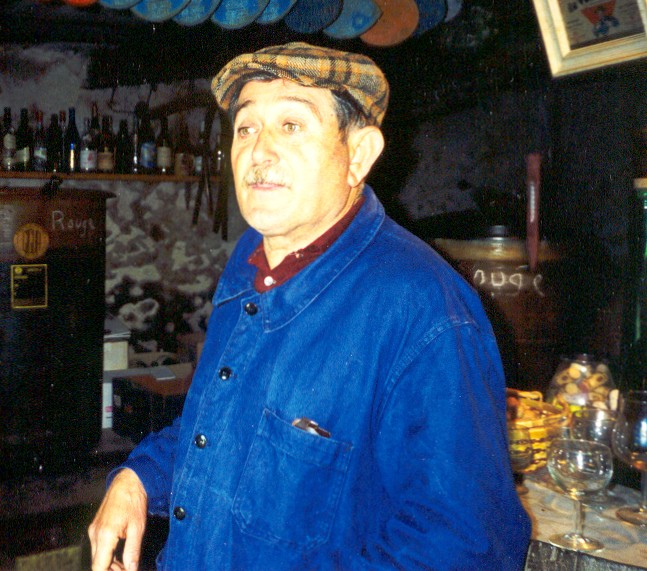
Roland Hugonin, 64, our village winemaker. His vineyard was passed down from his grandfather. |
"Well, I only know how to make Champagne," the man said.
"But I've got a friend who is a vigneron in Beaujolais and
I'll ask him to help you."
And he did.
"The quality of my wine improved by fifty percent," Roland
says.
All over France other winemakers were having their Eureka! moments,
too.
Like Roland Hugonin, many of them had not been formally schooled in
wine-making, they had simply a followed tradition going back a thousand
years.
The idea of following tradition sounds desirable and nostalgic, lost to our
modern times. And in fact you can't trump it when it comes to cooking. My
wife Claude quickly admits that French cuisine was better in her grandmother's
day. Women did not hold outside jobs. Time was not an issue, and they were
prepared to spend hours cooking. The smallest details were carefully observed,
there was no such thing as canned or frozen. And the quality of natural ingredients
(chemical fertilizer was unknown) was at its highest.
Oddly enough, tradition proved to be the bane of modern wine-making. It had
to do with a simple concept: cleanness and paying attention to details. It
wasn't entirely the winemakers' fault. The wine merchants encouraged them
to follow tradition. And tradition called for them to make the wine in the
same barrels each year--barrels that had been washed but not scrubbed beforehand.
It was thought that the old wine, still coating the barrels, gave a better
taste to the new wine.
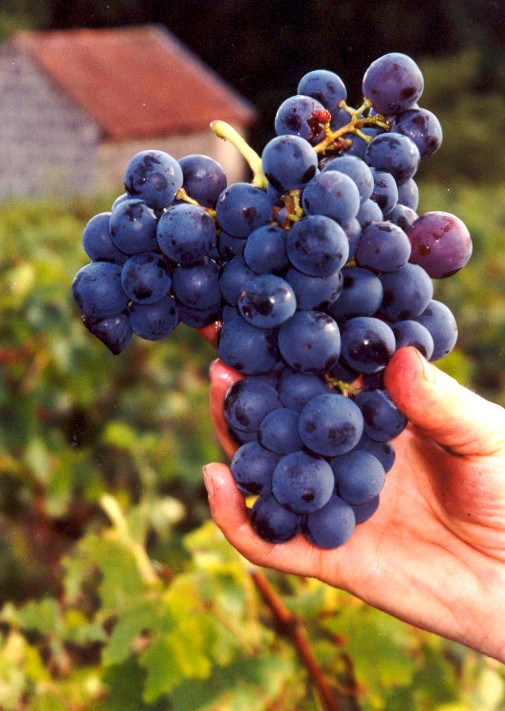
The grapes of our village. French wine has never
tasted better in history--though consumption is dropping. |
In retrospect, the error seems obvious. Anybody can run a simple test.
Leave a glass of wine sitting for a day or two and you quickly discover
that it doesn't smell as good. Leave it sitting for even longer and
it takes on a vinegary taste.
So what would happen if you poured new wine into a barrel coated with
old wine that had been sitting there for months? Yes, it would produce
a wine of inferior taste.
But French winemakers, at least many of them, didn't realize this until
about twenty years ago, when scientific methods were applied to wine-making
and laboratory techniques revealed the error.
Today many winemakers have shifted to easily-cleaned stainless steel
vats for the fermentation process, after which the wine is put into
well-scrubbed barrels for aging.
Shocked by this revelation, winemakers suddenly realized that they had to
reassess the other steps in wine-making which they had taken nonchalantly
as routine and not worth consideration--the old "we've-always-done-it-that-way"
syndrome. They realized that absolute cleanliness had to apply from the moment
the grapes were harvested until the wine was corked in the bottle. They also
had to pay attention to the smallest details of each step in the process.
So the wine of our village's Roland Hugonin has become quite drinkable. Our
area has never produced anything of higher quality than table wine. Why? That's
one of the mysteries of soil and sun. We sit on slopes overlooking a valley
formed by the Cher River. Good drainage and decent soil. But nobody will ever
suggest that we have wine on the level of a Burgundy with an AOC grading,
not to mention something like a Savigny-Lès-Beaune, one of Claude's
favorite wines, which our guide book describes as having a very good bouquet,
subtle, perfumed, and mellow. (We both prefer Burgundy to Bordeaux, no doubt
a heresy to many wine experts.)
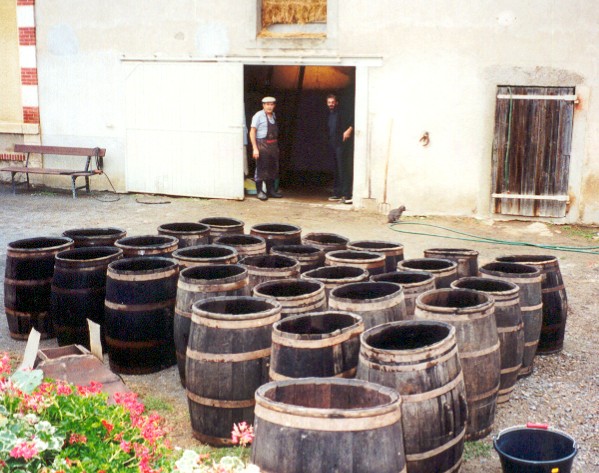
Barrels outside our village winemaker's. After making wine for 1500
years, French winemakers discovered 20 years ago that scrubbing the barrels
before re-using them would give their wine a better taste. |
Yet, despite the unremarkable quality of the wine, our village was
born from the vineyard, as the French say. One big reason was that there
were plenty of churches in our area, and the churches needed a lot wine.
In 1095, the Lord of our village, Humbaud le Jeune, gave a vineyard
to the parish, "under the condition that the wine serve exclusively
for the Saint-Sacrifice [mass]."
It sounds like the Lord was a little suspicious of the priests. And
indeed, a couple of hundred years later one of them was still complaining
that the wine wasn't strong enough.
Just before the phylloxera hit in 1886, there were 1200 hectares (485
acres) of vines in our small area alone.
Phylloxera was the Black Death of wine-making. Nobody knows where it came
from, but it started in the south of France. Grape vines shriveled and died.
No treatment worked. It hit our village on May 24, 1886, when someone brought
a vine for grafting from the south. It was a disaster all over France. When
it hit here, our village was thriving, with 3,000 inhabitants. Today, we have
about the same number. Time just stopped.
A solution was found by importing American vines, which were resistant to
the disease. The phylloxera infested vines were destroyed and the American
vines planted. But this was an expensive proposition and though the village
was relatively wealthy, it was wealthy in land, not money. One by one, families
went under. There was a brief Renaissance after World War One, and it looked
as though the wine growers would recover.
But then the factories started pulling people from their farms. Slowly, over
the years, the vineyards disappeared (including the one on our farm), until
only Roland Hugonin was left, plus several others in the surrounding area.
Monsieur Hugonin has proved to be a wonderful keeper of the flame. He is passionate,
articulate, full of facts about his subject--also anecdotes. Ask him a question
and he says, "First, let me tell you an anecdote about this." And
off he goes on a witty flight that hedgehops over the vineyards and cellars
of France.
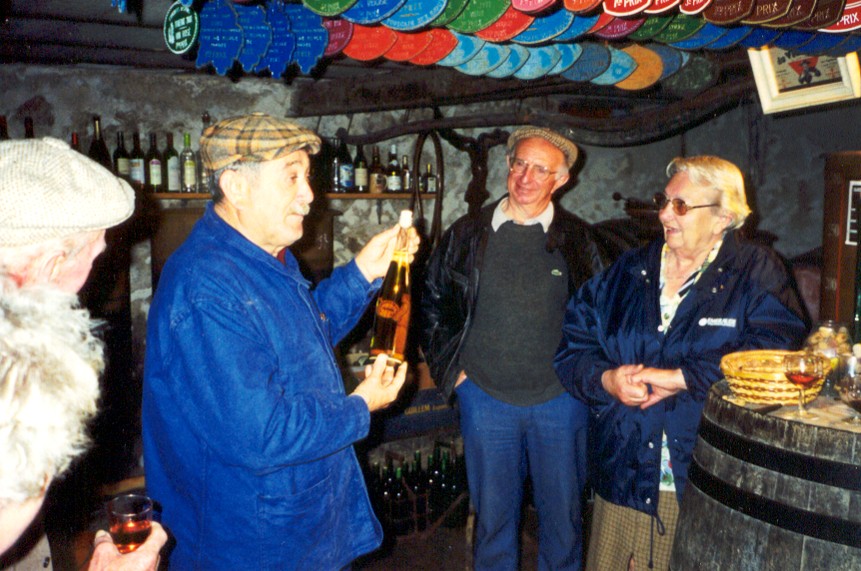
When friends and clients visit Roland Hugonin's wine cellar, they
get not only wine but also a witty and passionate dissertation on this
marvel of life. Hanging from the ceiling are his awards from
local tasting contests. "I used to wind up last or maybe eight or ninth," he says.
"Now I sometimes take first prize."
|
La Vendange
There is specific work to be done in wine growing which changes with the
months. November-December is the time the soil must be worked to protect the
vine from the cold of winter.
March is one of the most important, upon which much hangs. There is a saying
among wine growers: Taille tôt, taille tard, rien ne vaut la taille
de mars. (Prune early, prune late, nothing is better than to prune in
March.) How well you prune will determine the size and quality of your harvest.
And pruning is not easy. It's an art form which takes the equivalent of a
super green thumb. The last time I pruned one of our vines, it up and died
on me. Claude was not overly amused.
But nothing is more anticipated than the vendange, which takes place
from September 20 to early October, depending upon the region and the weather.
The translation of vendange is "grape-gathering." But that
sounds far too prosaic. It carries none of the emotion that falls like poetry
from French lips when they say "vendange." The French are
not a very smiling people, but they never say vendange with a frown.
It is a happy word.
How the vendange is carried out varies from region to region. Each
has its own traditional costumes. Even the baskets used to carry the grapes
are different. In Burgundy they use woven baskets; in Bordeaux, the baskets
are made from wood. One thing is the same: they all celebrate with plenty
of wine and food and dancing.
The vendange is sort of like the old barn-raising times in America,
when neighbors came from miles around to help build someone's barn. At Roland
Hugonin's last vendange 58 people showed up, some of them musicians
who travel around our region playing at fairs and feasts, to maintain a tradition
that goes back centuries.
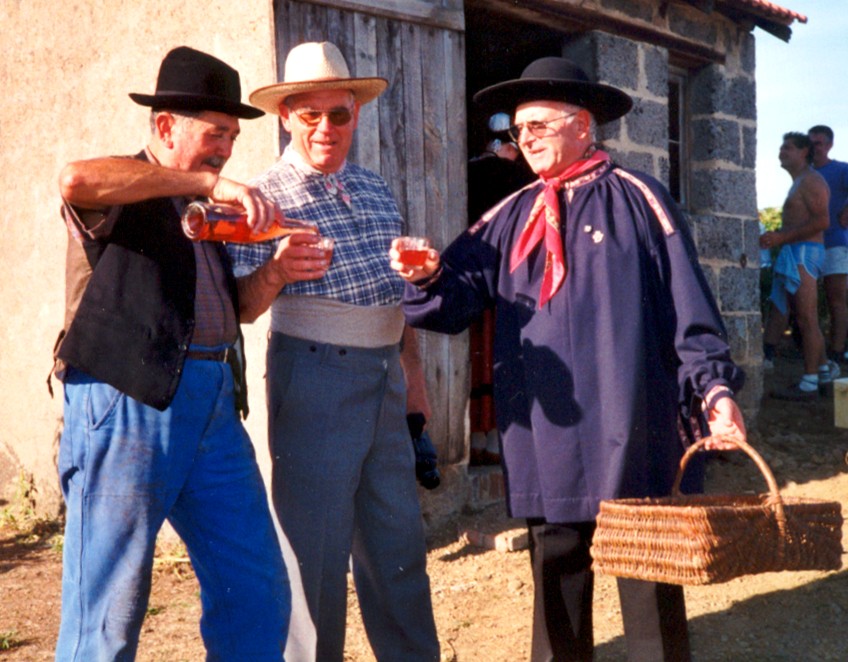 |
What do you do before starting out on the vendange? Of course. You start off with "un p'tit coup." Roland's rosé is as good or better than a regional rosé
from Provence.
|
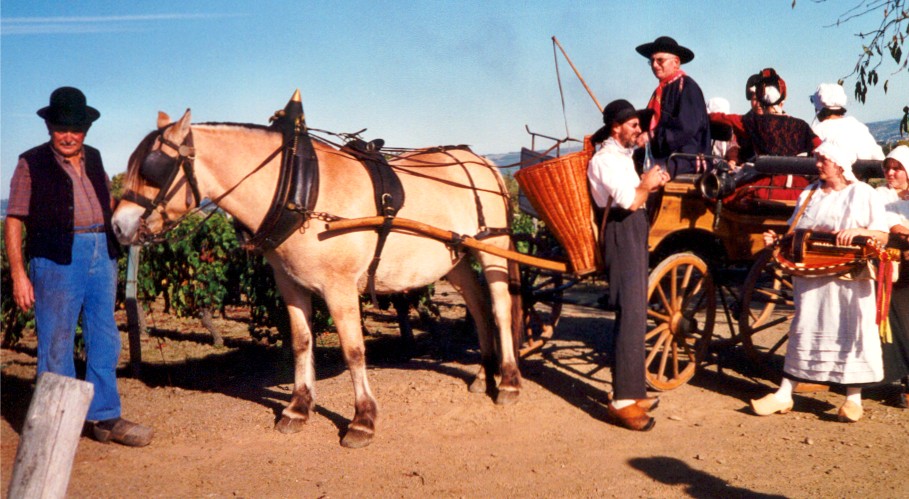
Arriving at the vineyard. Note their wooden shoes, called "sabots."
I remember as a kid being intrigued to learn that is where the word "sabotage"
came from. They threw their wooden shoes into the machinery to disable
it. |
New Wine in Old Bottles
Ironically, at the time wine began to get better, the French started drinking
less. The improvement in taste happened to coincide with cultural changes
that swept the country. Mainly, it had to do with the young. They began to
opt for Coca-Cola, which went well with another trend, heretofore unknown--eating les snacks. (The young French are paying the same price as their American
counterparts: They are getting fatter.) The average person's consumption of
wine dropped from 26.5 gallons a year in 1960 to 14.5 gallons now and is still
declining
Consumption has dropped among mature adults. There are growing health concerns
about the use of alcohol, which constitutes a major change in attitude, because
the French used to be in denial when it came to wine. They avoided thinking
of it as potentially dangerous alcohol and considered it as just a benign
accompaniment to their meals, even though, of course, they knew better, since
evidence of alcoholism was all around them. They have also discovered that
operating a computer becomes a bit of a problem after a long lunch bien
arrosé (well watered). The number of daily drinkers declined from
47 percent in 1980 to 24 percent today.
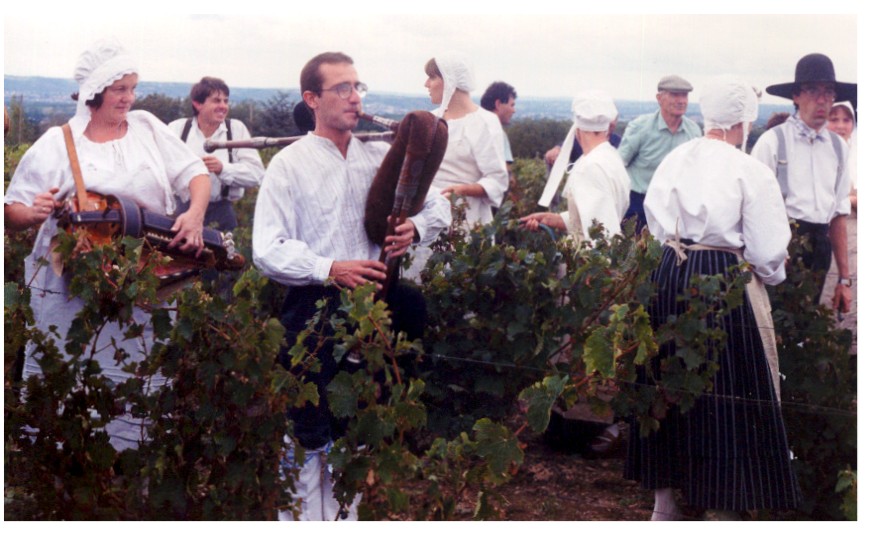
Nothing like a little traditional music to stir you up for the backbreaking
labor of harvesting grapes. |
How do me and my friends--older guys--feel about this decline in consumption?
Oh, it's really terri--well, wonderful! Since there is not much of a market
any longer for cheap wines, the French have given up the idea of quantity
and replaced it with quality. Vineyards in the south that used to produce
a lot of drinkable but unremarkable cheap wines have been abandoned or pulled
up and turned into prime real estate. The wine has got to be good or it won't
sell. Since it is all a matter of supply and demand, you can now find good
wines at cheaper prices. These are usually regional wines that don't travel
very well--certainly, they would have a nervous breakdown before making it
to the United States and never taste the same
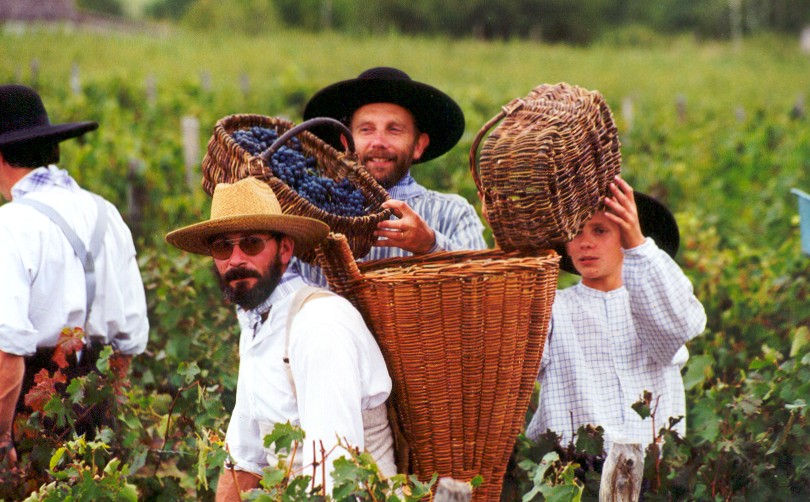
After the ceremony, it comes down to this. The grapes are carefully
cut with pruning scissors and
then transferred from individual baskets to a larger one, which is emptied
into a barrel. |
Qualité/Prix
The French have never been ones to throw around their money. And searching
for a balance between quality and price has always been a part of buying wine.
What wine you buy depends upon the occasion, depends upon the people involved,
depends upon your budget. I am writing this on a Saturday morning. A friend
has invited us to dinner this evening, to meet several doctors who are friends
of theirs. This will be an above-average occasion, but nothing truly special.
I will report on what wines were served when I pick this up tomorrow morning.
Sunday - It was an agreeable evening, as it always is at Robert and
Odile's (see "The Model Surgeon"). The guests included a biologist,
a pharmacist, a doctor and his wife, a beautiful woman from Mauritania. You
can be sure that nothing out of the ordinary will happen at a dinner party
like this. Even at their most informal, the French are still more formal than
Americans. This sometimes leads to a certain blandness in the conversation,
since everybody steers clear of controversial subjects. On the other hand,
you don't go home and spend the night awake, telling yourself, "I should
have said this, when he (or she) said that." Robert made a piece of veal,
cooked four hours in a quart of vinegar with tarragon, as the main dish. When
he later asked me what I thought, I said, "Very good, though not quite
as good as Claude would have done it." He said, "You have put me
in an impossible competition, and I accept the compliment. Thank you."
Anyway, the wine. As an apéritif to go with foie gras on toasted bread,
Robert served a white Bordeaux sauvignon, a 1998 Château Les Sept Chênes,
Appellation Bordeaux Contrôllée. The wine was recommended by
the chef Paul Bocuse to Robert's wine club. Price $7. To go with the meal,
he served two different red Côte Roannaise, which is close to a Côtes
du Rhône, and comes from Renaison, about 70 miles from Lyon. The wine
is made by Robert Serol, and he is our preferred vigneron; we know him and
his wife and family. In fact, it was Claude who took Robert to Serol's to
buy this wine while I was in Cambodia. The Michelin 3-star restaurant, Troisgros,
is located in nearby Roanne, and Robert Serol has a deal with Pierre Troisgros
to produce a joint-labeled wine. It has an AOC. Again, we are talking quality
versus price. The Pierre Troisgros/Robert Serol bottle cost five dollars,
the other one three dollars. So Robert spent a total of $15 on his wine. For
simply an above-average dinner party, the wine was appropriate and enjoyed
by all. Similar wines were being served at similar dinners all over France
on Saturday night.
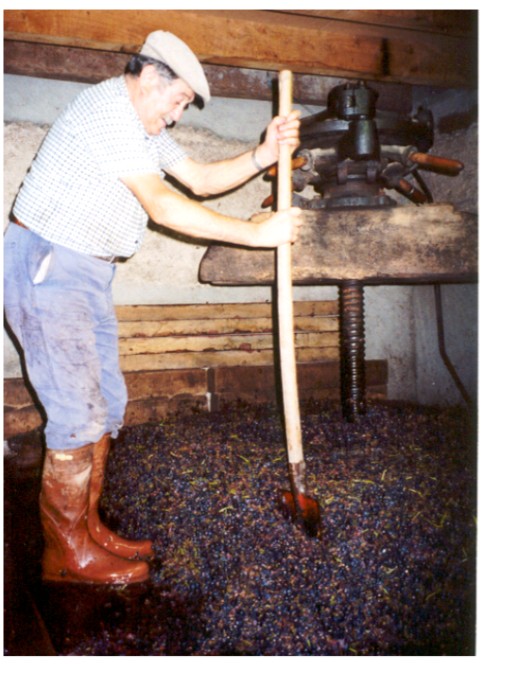
After the harvest, Roland Hugonin prepares his grapes for pressing. |
This emphasis on quality/price is not so much based on money as it
is on the chase. It's sort of like an Easter egg hunt. We have spotters
who phone us when a good regional wine shows up in one of the discount
chains.
When a good regional appears, the word goes out and you'll see Mercedes
and BMWs parked at the place where it is on sale. It is soon gone, maybe
not to reappear for several years.
Men have traditionally been responsible for the wine, but women are
now playing a more active role, of course humoring the men as they do.
I send Claude out on scouting expeditions. She has the kind of personality
that makes men want to help her choose a good wine.
Just the other day, for example, she was looking over the wines at
a shop and a guy walked up and recommended a Coteaux du Tricastin, which
carries an Appellation Contrôlée and comes from near Provence.
She bought a bottle and brought it home for a tasting. This was our Eureka! moment. It was quite good. She hopped back in the car
and went to buy two cases. It cost $2.30 a bottle.
Of course, this competition sometimes gets out of hand. My friend Max likes
to one-up everybody. We were sitting outside under the lime tree the other
day, and he was telling me about his success in renovating a friend's house,
installing the electricity, a bathroom, everything. I believed him.
In between chain-smoking one of his cheap Gitanes, he suddenly said, "I
found a Bordeaux, a regional without an AOC or anything, but really good."
He kissed his finger tips for emphasis. "Guess how much it cost?"
I wasn't going to play his game. I knew what was coming--something outrageous.
"I don't have a clue, Max," I said.
"A buck forty a bottle," he said. "Dix balles."
I stared at him.
"Well," he said, looking away, as he lit up. "I admit that
it was on sale as a loss leader to draw customers in."
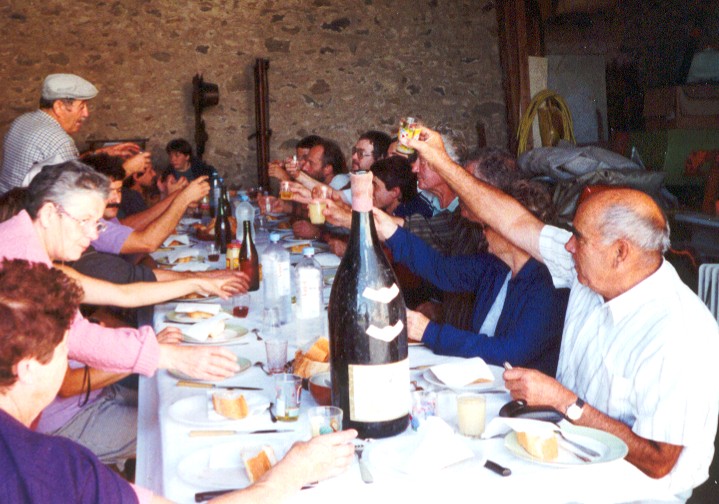
Most French special occasions have a certain symetry--they start with
food and wine, and end the same way. We certainly could expect no less
of la vendange. "À la votre, Monsieur Hugonin!" |
Searching for Monsieur Moderation
Roland Hugonin is fond of saying: "I always try to drink with moderation.
But I can never find Monsieur Moderation, so I have to drink alone."
He is just kidding, of course. Although I had met Monsieur Hugonin only casually,
he and I shared a close friend, Louis Marceau--"P'tit Louis." A
handsome guy with a beautiful soul, beloved by Claude's father, Panou, and
everybody else in our neighborhood. He never got married, and there were whispers
of a sad tale of unrequited love. Whatever the cause, Louis Marceau had a
problem.
I was passing his house on a walk with my dog early one morning, and Louis
Marceau stopped me. "Zéline [giving my name the French pronunciation],
come in and have a drink." I entered his small, bachelor-in-disarray
house, and he proceeded to pour me a drink--a water glass full of eau de
vie, a clear brandy distilled from the residue of the wine grapes. He
was charming, irresistible, you had to love him. Since Louis Marceau had his
own vines, he made his own wine and eau de vie. From then on, I took
another route on my morning walk. He died at age 52.
So it is not a bad idea that the French have cut back on their consumption
of wine. Forty percent of their auto accidents are associated with alcohol.
I try not to get on the road after lunch for any distance. Still, even with
the cutback, the French remain the world's largest consumers of wine, drinking
920 million gallons a year, 16 percent of the world's total. I have a feeling
wine will be around for a long time.
As for Roland Hugonin, he is retiring. In order to qualify for his pension,
he must destroy a part of his vineyard, leaving enough vines to provide wine
only for the private consumption of himself and his friends. He thinks someone
else will take over to maintain the tradition.
Sadly, I don't believe it. But we are left with the hopeful thought that
somebody will, and the words of the poet Thomas Moore:
What though youth gave love and roses,
Age still leaves us friends and wine.
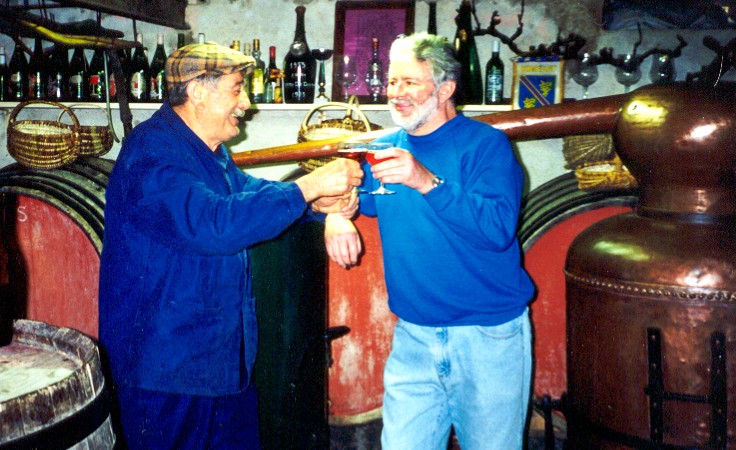
The Village Winemaker and I on May 15, 2001, at 10:30
a.m. Sipping wine on an empty stomach during a morning interview is pleasant,
but it definitely has a downside: I couldn't read my notes. Luckily, he
is such a vivid personality that I had no trouble remembering. |
|